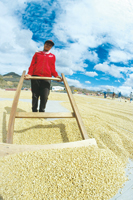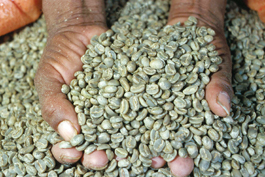home | metro santa cruz index | news | santa cruz | news article

Sifting for solutions: Member farms in CAN's network implement cooperative business models that ensure profits are spread evenly among workers.
Brewing Coffee and Consciousness
Local nonprofit brings Costa Rican coffee farmers to town
By Leah Bartos
Whether you prefer a double low-fat half-decaf mochachino with whipped cream or just a plain cup of black coffee, chances are you are among the 100 million Americans who partake in the daily ritual of coffee consumption.
But regardless of your tastes and motivations for caffeine intake, organizers from the local chapter of the Community Agroecology Network (CAN) hope you'll consider the source of your coffee.
In an effort to foster a connection between the grower and the consumer, CAN is sponsoring a weeklong visit from Noemy Herrera and Roberto Jimenez, a husband and wife pair of coffee farmers who run the CoopePueblos cooperative farm in Costa Rica. CoopePueblos is part of a network of cooperative coffee farms in Central America and Mexico that CAN members work with to help develop sustainable and self-sufficient farming practices.
CAN takes the dubious "fair trade" label to the next level by eliminating expensive middlemen and instituting what it calls the "fair trade direct" model.
The Jimenezes, along with Julieta Méndez, a Costa Rican internship coordinator for CAN, will be speaking at a series of events this week in Santa Cruz designed to raise awareness around coffee production and tighten the links in an ever-more globalized world.
Nick Babin is a researcher for CAN and has spent extended periods working on the CoopePueblos farm. He says that he hopes the Costa Rican delegation will help people in Santa Cruz to conceptualize their role in the global trade network.
"There's a human element to it. It's not this faceless process," says Babin, who is also a second-year Environmental Studies graduate student at UC-Santa Cruz. "You have on one hand people buying coffee for $4 for a latte and people on the other end barely making a living."
CAN is hoping to change that disparity. While many praise the growing popularity of the "fair trade" label in the mainstream, some caution that it may not be as good as it seems. Karie Boone, the Santa Cruz CAN coordinator, explains that with "fair trade," there are still various middlemen, such as marketers, roasters, importers and exporters, who are "taking a chunk of the pie." Furthermore, she says, most of these middlemen are in North America and therefore not bringing revenues to the communities in which the coffee was produced.
"What that translates to is the cooperative getting less money and the consumer paying more," Boone says.

Black gold: The fair trade direct model improves returns to coffee farmers by eliminating various middlemen from the trade route.
According to CAN's estimations, by eliminating these middlemen, the farmers in the CAN cooperatives receive $3.25 in profit per pound in the fair trade direct model, whereas they would only receive $1.26 per pound under the fair trade certification label. Farmers often receive less than $1 per pound under conventional marketing methods.
"There's a lot at stake, because at the end of the day, the farmer needs to sell his product and make a living," Boone says.
Making these types of connections is exactly what this week's CAN events are designed to do. The Costa Rican trio will kick off their visit at the downtown Santa Cruz Farmers Market on Wednesday, May 9, where they hope to meet with consumers and exchange ideas with other local vendors. They will also present a "virtual tour" of the CoopePueblos farm and share strategies for environmental and biodiversity conservation.
The Costa Ricans will then be teaming up with the local Swanton Berry Farms, located just north of Davenport on Highway 1, to co-host a Mother's Day event on Sunday, May 13, complete with strawberry shortcake and CAN coffee. On Monday, May 14, CAN will be collaborating with UCSC's Education for Sustainable Living Program (ESLP) to present the second annual International Cafe and Fair Trade Marketplace at Classroom Unit 2 on the UCSC campus. The event will feature panel discussion with the CoopePueblos cooperative members, as well as a space for vending fair trade products from CAN and other organizations.
"Not everyone can afford organic and fair trade," Boone says. "I do think conscious consumption is a start--not an end--but a start. Even if you don't buy fair trade coffee or organic, being in touch with where ever your community is, just knowing your neighbors. Simple things like that."
Costa Rican farmers from the CoopePueblos cooperative appear Wednesday, May 9, 2:30-6:30pm at Santa Cruz Farmers Market, Lincoln and Cedar streets; Sunday, May 13, 10am-2pm, Swanton Berry Farms, off Hwy. 1 north of Davenport; and Monday, May 14, 6-7pm, at the International Cafe and Fair Trade Marketplace, Classroom Unit 2 on the UCSC campus. (www .communityagroecology.net)
Send a letter to the editor about this story.
|
|
|
|
|
|